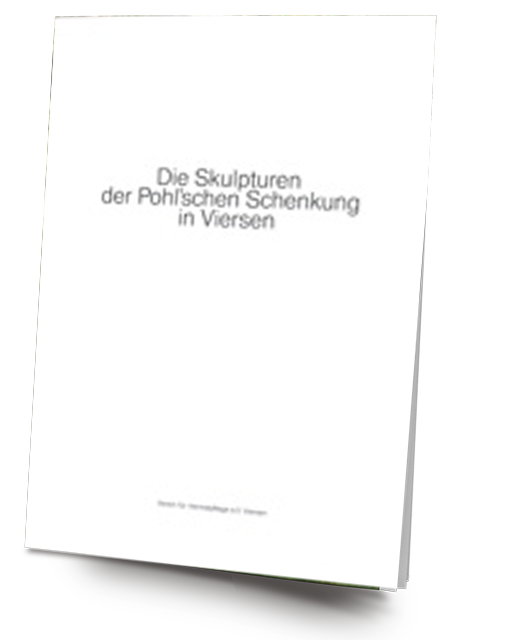Figur
Skulptur von David D. Lauer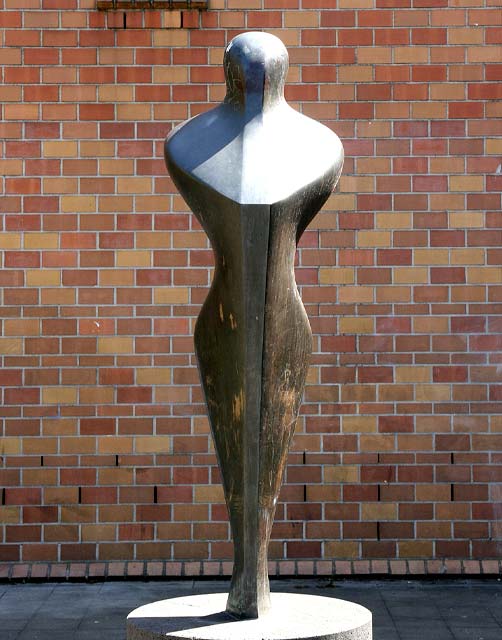
Informationen zur Skulptur
Künstler
David D. Lauer
Material
Größe
Entstehungsjahr
Aufstellungsort
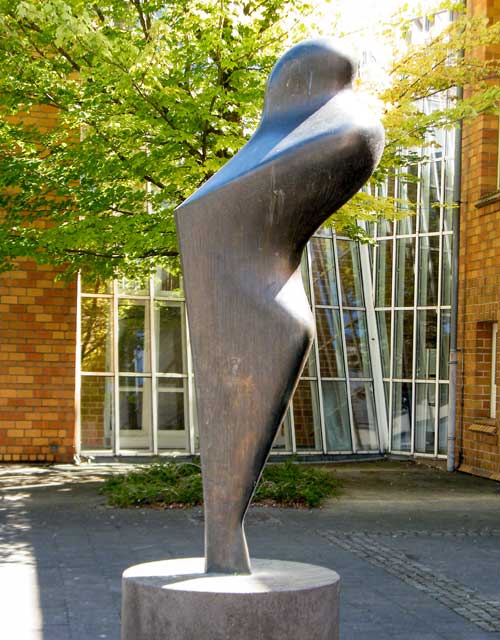
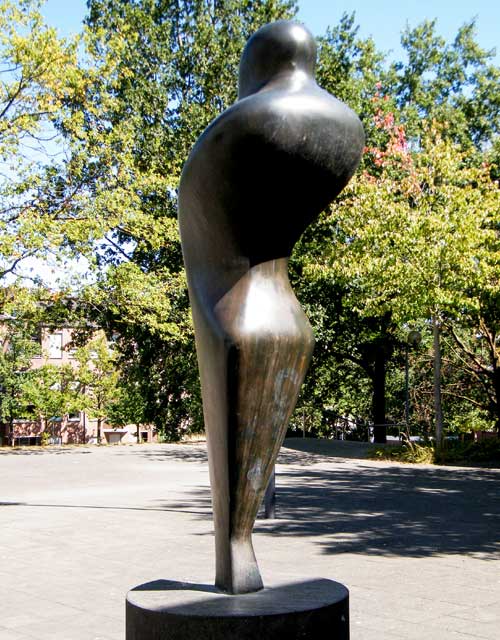
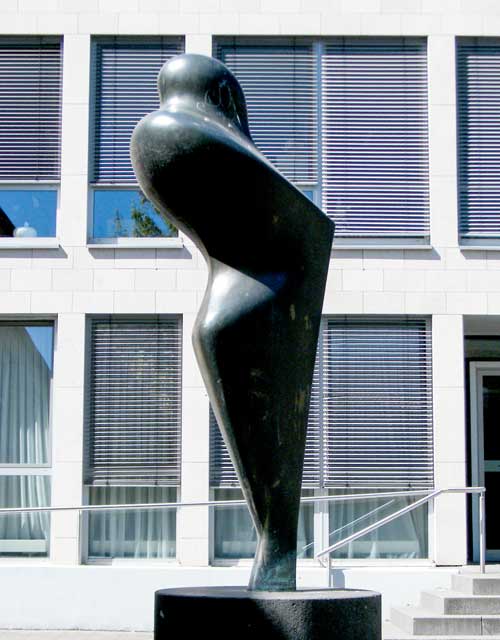
David Lauers Plastik besteht aus zwei Teilen, dem figurativen Bronzekörper von 180 cm Höhe und einem zylinderförmigen steinernen Sockelpodest aus Basaltlava, das der Bronze als Standfläche dient. Die gelb-grünlich durch ihre Patina hindurchschimmernde Bronze hebt sich nicht nur in der Farbe vom grauen Sockel deutlich ab. Sie ist mit ihrer Standfläche nur durch eine schmale Verjüngung des Körpers an der stilisiert zusammengezogenen Fußzone verbunden. Das körperliche Gewicht der Plastik liegt im Bereich des Oberkörpers und der stilisierten Armbildungen. An der Bronze lassen sich mehrere unterschidliche Arten der Körperauffassung herausstellen: Neben der bereits beschriebenen Silhouettenwirkung zeigt die vordere, zur Terrasse des Forums gerichtete Seite der Figur zwar ebenso eine streng vertikale Ausrichtung, doch wird sie hier vor allem durch eine nach oben laufende, scharfkantige doppelte Gratführung gegliedert, die in ungefähr zwei Dritteln der Höhe abbricht und in zwei sanften Armführungen zu den breiten Schultern der Figur hinaufläuft.
In der Vorderansicht assoziiert man eine kraftvolle, wie auf ein Schwert gestützte Wächterfigur, deren Attribute allerdings nicht einzeln ausgebildet sind, sondern mit der Körperform zu einer Einheit stilisiert, gleichsam inkorporiert sind. Die assoziierbaren Gegenstände und der Leib des ,Wächters´ sind wie ein geschlossener, ummantelter Körper zusammengezogen. Die zur Freitreppe der Terrasse gerichtete Rückseite der Plastik bietet einen ganz anderen Anblick. Gesäß, Schultern und Kopf der Figur scheinen sich eher in vegetabile Formen zu verwandeln, die symmetrisch angeordnet sind. Eine stabilisierende Mittelachse, wie sie von der Vorder- und Rückenansicht jeweils suggeriert wird, fehlt der ganzen Figur.
Dadurch treten die beiden Körperhälften vor allem in der Seitenansicht in einer spannungsvollen Dehnung auseinander, so als wollten sich beide Teile zu verschiedenen Seiten hin verselbständigen: nach "vorne" hin zu einer strengen, hart und technischen anmutenden Form (dem "Wächter"), und dem entgegengesetzt auf der Rückseite in ein dreifach übereinander-gestuftes pilzartiges Gewächs, dessen Ausladung das Gleichgewicht des Ganzen zu gefährden scheint.
Die Masse dieses "Gewächses" droht nach hinten in den Raum wegzudriften. Diese exzentrische Körperbildung wird durch das zylindrische Sockelpodest zusammengehalten, das die Bronzefigur zum Schein in eine Rotationsbbbewegung bringt. In der Gesamtkomposition der Bronze auf dem Sockel läßt sich ebenfalls das vegetabile Motiv einer Blüte wiedererkennen, knospenhaft verschlossen, so als stünde die Möglichkeit der Entfaltung konzentrierter Kraft unmittelbar bevor.
Das figurative Werk David Lauers hält sich in der Schwebe bei der Ausbildung organisch technoider Konstrukte. Varianten seiner Plastiken loten die dabei möglichen Bereiche von Gestaltbildungen bis hin zur Gegenständigkeit aus. Die seit dem Auftreten des italienischen Futurismus der durchaus programmatisch vertretene Forderung nach einer Vereinigung körperlicher Organismen und des Technoiden in übersteigerten, dynamisierten und zu ungeahnter Kraft potenzierten Gebilden scheint bei Lauer weniger polemisch als vielmehr lyrisch aufgegriffen und fortgebildet zu sein
David D. Lauer
Studium der Bildhauerei an der Staatlichen Akademie der Bildenden Künste Karlsruhe
Meisterschüler bei Prof. Kindermann
Professor an der Akademie Karlsruhe
lebte in Gleisweiler, Pfalz
7. Januar 2014
gestorben
Publikation "Die Skulpturen der Pohl'schen Schenkung in Viersen"
David D. Lauer - Figur
K. H. Hödicke - Kaspar
Verkaufspreis: 2,50 €

